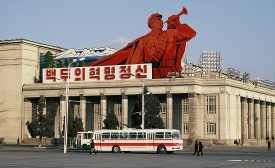international broadcasting
A Saudi Arabian sociologist aims to counter stereotypes about her country with a coffee table book profiling successful Saudi women [...] "We are facing challenges but we are succeeding," said [Mona AlMunajjed] at the book signing for her work "Saudi Women: A Celebration of Success." The large-format book features her interviews with 40 Saudi women from a variety of fields, alongside their photographs.
The European Union is facing increasing pressure to speak out against the erosion of media freedom in Turkey following the forced take-over of the country’s largest-circulation newspaper, but few expect it to take a bold stance toward Ankara while trying to assure its help in dealing with the migration crisis.
“Enough is enough. America desperately needs a modern, dynamic international broadcasting agency to take on ISIS and Russia’s propaganda in real time, over the internet and on the airwaves with the accurate news and information.”
The fun and joy that Xinhua is searching for reflects a quandary facing China’s leadership: As Xi navigates a difficult phase of his administration, his messaging machine — for decades one of the Communist Party’s most crucial levers of power — has been struggling to make itself heard.
The BBC has confirmed its intention to create a radio service for North Korea, although, despite a recent report, a start date for this service has not been set. North Korea’s recent test of what it described as a hydrogen bomb, and its launch of a long-range missile, have instilled urgency to the BBC’s plans.

The BBC is planning a radio service to N. Korea, and will have to navigate a landmine to do so.







